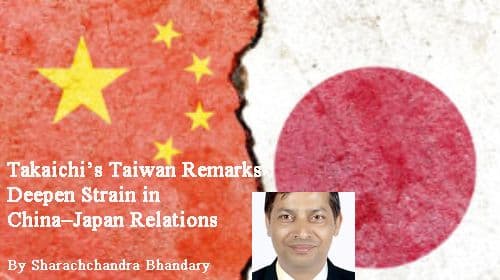
Tensions between China and Japan have intensified following Japanese Prime Minister Sanae Takaichi’s strong comments in parliament regarding a possible Chinese military move against Taiwan. Her statement — that such an action could pose an “existential threat” to Japan — has triggered an unusually sharp reaction from Beijing, adding fresh strain to a relationship already marked by strategic competition.
Takaichi made the remarks while responding to questions about Japan’s preparedness in the event of escalating conflict in the Taiwan Strait. She suggested that certain forms of Chinese military coercion, such as a blockade or use of force, could compel Japan to consider measures under its collective self-defense framework. When asked to withdraw her comments, she refused, maintaining that her position reflected Japan’s national security priorities.
Beijing’s response was immediate and uncompromising. Chinese officials declared that the current turbulence in bilateral ties stemmed directly from what they called the Japanese prime minister’s “blatant” and “erroneous” remarks on Taiwan. According to China’s Foreign Ministry, the comments grossly interfered in China’s internal affairs, violated the one-China principle, ran counter to the spirit of the four political documents guiding China–Japan relations, and weakened the very political foundation on which the relationship stands.
China further emphasized that it will firmly safeguard what it describes as its core interests and international justice. It called on Japan to retract the remarks, acknowledge the mistake, and return to what Beijing views as the correct course. China has cited the 1972 Sino-Japanese Joint Statement as clear evidence of Japan’s commitments, noting that the document explicitly states that Japan recognizes the Government of the People’s Republic of China as the sole legal government of China, and fully understands and respects China’s position that Taiwan is an inalienable part of Chinese territory. Beijing has reminded Tokyo that these commitments must remain binding regardless of which administration holds power in Japan.
The latest dispute comes at a time when the Taiwan Strait has become one of the most sensitive flashpoints in East Asia. While China asserts sovereignty over Taiwan, Japan sees peace and stability in the Taiwan Strait as essential to its own security and to the protection of sea lanes central to its economy. This diverging view has increasingly influenced Japan’s evolving defense posture.
Domestic political dynamics also play a role. Takaichi’s firm stance resonates with segments of the Japanese public who support a more assertive security policy. Her remarks are thus seen not only as foreign-policy signaling but also as an expression of political strength at home.
In reaction, China may resort to diplomatic pressure, intensified maritime activity, or economic measures — tools it has used in past disputes to register displeasure. Early indications suggest a phase of heightened friction is likely, including stronger public messaging from Beijing and increased scrutiny of bilateral exchanges.
Despite the heated rhetoric, both countries appear aware of the risks of uncontrolled escalation. Japan has already sent senior diplomatic officials to Beijing to ease tensions, while China has signaled that dialogue remains possible if Japan clarifies or moderates its position. The most probable near-term scenario is a continuation of managed tension, where sharp exchanges persist but direct confrontation is avoided.
Still, analysts warn that misunderstandings or unintended incidents, particularly at sea, could worsen the situation. As military and coast guard vessels operate in increasingly crowded waters, even small miscalculations could have disproportionate consequences.
The episode underscores the fragile balance underpinning East Asian security. Taiwan remains a pivotal issue, and both Japan and China must navigate it carefully. The coming weeks will reveal whether diplomacy can stabilize relations or whether this latest dispute marks the start of a longer, more challenging phase in bilateral ties.
Mr Bhandary is Executive Editor at the National News Agency (RSS)


